| Srl | Item |
| 1 |
ID:
102278


|
|
|
| 2 |
ID:
173689
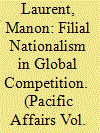

|
|
|
|
|
| Summary/Abstract |
In the early 2000s the Chinese government initiated a profound shift in how it sought to represent China at home and abroad. Whereas many scholars and China watchers argue that a newly assertive China emerged in the wake of the 2008-economic crisis, I argue that this shift took place in the curriculum reforms nearly a decade earlier. An analysis of the evolution of textbooks used for primary Mandarin instruction shows that, starting in 2001, textbooks were developed to inculcate a perennial bond between an increasingly globalized population and its motherland. Specifically, I show how the emergence of “filial nationalism” was crafted in Mandarin-language textbooks, laying the groundwork for a new generation of Chinese youth to simultaneously feel pride for and loyalty to the motherland while preparing them for integration into a globalized world.
|
|
|
|
|
|
|
|
|
|
|
|
|
|
|
|
| 3 |
ID:
106706


|
|
|
| 4 |
ID:
157191
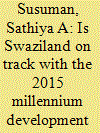

|
|
|
|
|
| Summary/Abstract |
According to the Millennium Development Goals (MDGs) agreement, each participating country has to periodically provide a report that will show the progress on their achievement towards the goals. This article’s aim is to evaluate Swaziland’s prospects of achieving eight MDGs by 2015. This article is an analysis of the current situation of Swaziland, and the aim of this analysis is to look beyond the statistical values to see if the achievements (including lifetime achievements) are on track and whether what is yet to be achieved can really be achieved. Secondary information was collected from various sources. Several countries and organizations have committed themselves to the following eight development goals: (1) eradicate extreme poverty; (2) achieve universal primary education; (3) promote gender equality and empower women; (4) reduce child mortality; (5) improve maternal health; (6) combat HIV/AIDS, malaria and other diseases; (7) ensure environmental sustainability; and (8) develop a global partnership for development. National development is dependent on many factors; therefore, different countries across the world have adopted the MDGs as means of alleviating many of the social ills hindering progress and development. Based on different sources, Swaziland is on track with its MDGs, and there is no doubt that Swaziland will continue to work hard to these ends. It has been argued that there has been progress made that has resulted in significant changes to people’s lives, but the question that has to be asked is how long these achievements can realistically last. A reduction of the rate of child mortality, maternal mortality and HIV/AIDS in Swaziland are needed.
|
|
|
|
|
|
|
|
|
|
|
|
|
|
|
|
| 5 |
ID:
102276
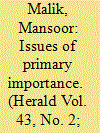

|
|
|
| 6 |
ID:
147622
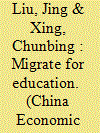

|
|
|
|
|
| Summary/Abstract |
A large number of village primary schools in rural China were closed since the 1990s. This paper studies the impact of the reduction in the number of primary schools on the migration decision of rural residents. First, using China Health and Nutrition Survey that contains information on community characteristics, we find that both the disappearance of village primary school and the increased distance to nearby primary school increased the migration probability of village residents. Second, using the 1% population survey in 2005 and prefecture level information, we find that the decline in the number of primary schools between 2000 and 2004 increased the migration probability of rural residents. Exploring the heterogeneous effects, we find that the migration of individuals with primary-school-age children is more sensitive to the relocation of primary schools, and that the effect is stronger for families with boys than those with girls. These results suggest that human capital investment motive and regional education policy play an important role in China's urbanization process.
|
|
|
|
|
|
|
|
|
|
|
|
|
|
|
|
| 7 |
ID:
102280
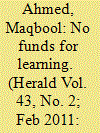

|
|
|
| 8 |
ID:
111486
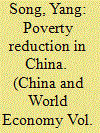

|
|
|
|
|
| Publication |
2012.
|
| Summary/Abstract |
Using the instrumental variable model and the regression discontinuity approach, this paper explores how access to primary education affects the Chinese labor market and helps people to escape poverty. Several important findings are obtained. The popularization of primary education has significantly reduced poverty in China, especially in urban areas. In contrast, the Compulsory Education Law has not been well implemented for older children in rural areas. In addition, the labor market premium for completing primary education is much larger in urban areas than in rural areas. Poor rural school quality might explain this rural-urban disparity. Effort needs to be made to further reduce poverty by ensuring adequate financial resources for primary education in poor areas and improving school quality in rural China.
|
|
|
|
|
|
|
|
|
|
|
|
|
|
|
|
| 9 |
ID:
129423
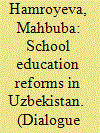

|
|
|
|
|
| Publication |
2014.
|
| Summary/Abstract |
After gaining independence, Uzbekistan created favourable conditions for development of education. Legal framework for working out a national education policy was the imperative of the day. Only on the
basis of a strong cadre policy could the country look forward to development and choose its own path. Adoption of the Constitution of the Republic of Uzbekistan was the first step in this direction that guaranteed all citizens the right to education. It provided that the State shall guarantee free secondary education to all children. Schooling is under the State control.1 Subsequent reforms were undertaken in a
phased manner and these reforms have helped in improving the structure and content of education. This paper deals exclusively with the school education at a time when the country transited from decadent Soviet system to a new system of school education.
|
|
|
|
|
|
|
|
|
|
|
|
|
|
|
|
| 10 |
ID:
052285


|
|
|
|
|
| Publication |
Mar 2004.
|
| Summary/Abstract |
The all-embracing discourse of population quality (suzhi) is put to work through rural primary schools in ways that help state institutions implement policies such as accelerating demographic transition, restructuring the education system, professionalizing labour markets, promoting agricultural skills training, instituting economic liberalism and carrying out patriotic education. Suzhi discourse facilitates policy implementation in four ways. First, it imbues disparate policies with seeming coherence. Secondly, by articulating a diverse set of policies through suzhi discourse, including state retreat from welfare provisioning, state institutions can be seen to be working to improve people's well-being. Thirdly, in making people responsible for raising their own quality, the need to improve suzhi is an explanation and a prescription when individuals are adversely affected by policies. Finally, suzhi discourse encourages individuals to regulate their conduct in accordance with the political drift of society. By enfolding suzhi norms into identity formation, the education system shapes each individual's ongoing process of "becoming" in ways that parallel the nation's modernization, thereby reducing the costs of policy enforcement.
|
|
|
|
|
|
|
|
|
|
|
|
|
|
|
|